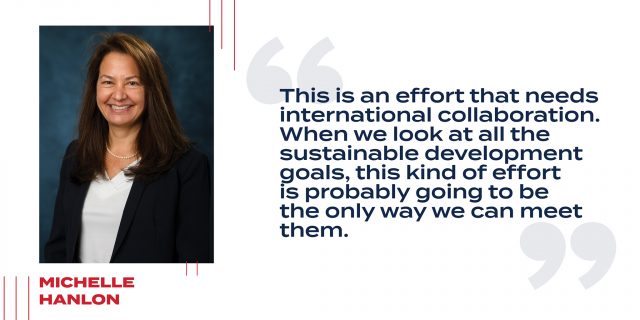 OXFORD, Miss. – The International Academy of Astronautics has named University of Mississippi law professor Michelle Hanlon to its permanent committee on space solar power.
OXFORD, Miss. – The International Academy of Astronautics has named University of Mississippi law professor Michelle Hanlon to its permanent committee on space solar power.
As countries look to develop clean, efficient forms of power, the IAA formed the Permanent Committee on Space Solar Power to advise on ways of harnessing and delivering sunlight-powered energy from outer space to markets on Earth.
“What the committee is doing is trying to show the world that this isn’t science fiction,” Hanlon said. “It can happen, and it’s something that governments should be putting a ton of work behind because not only is it clean, but it’s cheaper when you put the structures in place.”
The International Academy of Astronautics is an independent, nongovernmental organization that seeks to develop peaceful human space travel and exploration.
Hanlon, executive director of the Center for Air and Space Law in the Ole Miss School of Law and co-founder and CEO of For All Moonkind, will co-chair the legal and regulatory consideration subcommittee. Hanlon is among about three dozen people from across the globe appointed to the committee.
Orbital solar power could be a clean, efficient energy source that would reduce the carbon emissions contributing to climate change, but its implementation must be intentional, she said.
“If we are going to support this concept, we’re going to need a ton of solar panels up in GEO (geosynchronous Earth orbit) and that’s going to take up a lot of space,” Hanlon said. “This is an effort that needs international collaboration.
“When we look at all the sustainable development goals, this kind of effort is probably going to be the only way we can meet them.”
Beaming space-based solar power energy back to Earth is largely untried, but not unproven, she said. Though no country has yet launched a permanent solar-power station into orbit, the California Institute of Technology launched an experimental satellite in January that has successfully beamed power back to Earth. Meanwhile, China is leading the way in investing in space-based solar power.
In her role as co-chair, Hanlon will consider liabilities of such as satellites taking up large amounts of space in orbit and the possibility of large space debris. Deorbiting space debris can fall to earth – such as the mysterious metal object found on the coast of Western Australia this summer – potentially causing damage to property or life.
The highest priority for the committee, however, is persuading national leaders that space-based solar power should be a priority, Hanlon said.
“In the ’60s, the UN passed a resolution saying everyone has the right to receive radio communications,” she said, referencing UN General Assembly Resolution 1721. “That was the basis for how we communicate with each other now. We need an international push like that for solar power.
“I want to see a UN resolution that says everybody in the world has a right to access solar power through space.”